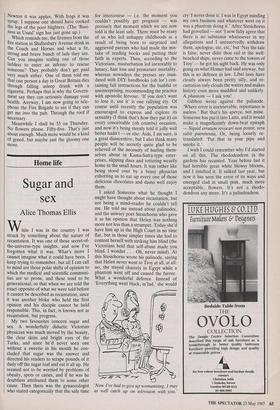Home life
Sugar and sex
Alice Thomas Ellis
My two favourites concern sugar and sex. A wonderfully didactic Victorian physician was much moved by the beauty, the clear skins and bright eyes of the Turks, and since he'd never seen one without a sweetie in his mouth he con- cluded that sugar was the answer and directed his readers to scrape pounds of it daily off the sugar loaf and eat it all up. He seemed not to be worried by problems of obesity, spots or caries, and if he was he doubtless attributed them to some other cause. Then there was the gynaecologist who stated categorically that the safe time for intercourse — i.e. the moment you couldn't possibly get pregnant — was precisely that moment which we are now told is the least safe. There must be many of us who led unhappy childhoods as a result of being born to surprised and. aggrieved parents who had made the mis- take of reading books and putting their faith in experts. Then, according to the Victorians, masturbation led inexorably to lunacy, hair loss and premature mortality, whereas nowadays the presses are inun- dated with DIY handbooks (oh lor') con- taining full instructions for the bashful or unenterprising, recommending the practice with apostolic fervour. 'If you don't want to lose it, use it' is one rallying cry. Of course until recently the population was encouraged to express and explore its sexuality (I think that's how they put it) on every conceivable (oh crumbs) occasion, and now it's being sternly told it jolly well better hadn't — or else. Aids, I am sure, is a great disincentive, but I also think many people will be secretly quite glad to be relieved of the necessity of hurling them- selves about in Kama-Sutra-type enter- prises, slipping discs and tottering wearily home in the small hours. It was rather like being stood over by a bossy physician exhorting us to eat up every one of those delicious chocolates and damn well enjoy them.
I asked Someone what he thought I might have thought about recantation, but not being a mind-reader he couldn't tell me. He told me instead about palinodes, and the unwary poet Stesichorus who gave it as his opinion that Helen was nothing more nor less than a strumpet. Today she'd have him up in the High Court in no time flat, but in those simpler times she had to content herself with striking him blind (the Victorians held that self-abuse made you blind. I wonder . . . Oh, never mind). At this Stesichorus wrote his palinode, saying that Helen never went to Troy at all, at all: no, she stayed chastely in Egypt while a phantom went off and caused the furore. What a wonderful defence. Instead of `Everything went black, m'lud,' she would Wow I've had to give up womanising, 1 may as well catch up on television with you.'
cry 'I never done it. I was in Egypt minding my own business and whatever went on it was a phantom doing it.' After Stesichorus had grovelled — not 'I now fully agree that there is no substance whatsoever in my allegations and I unreservedly withdraw them, apologise, etc, etc,' but Nay the tale is false; never didst thou sail in the well- benched ships, never came to the towers of Troy' — he got his sight back. He was only going on what Homer had said anyway, but this is no defence in law. Libel laws have clearly always been pretty silly, and re- cantation only clouds the waters and makes history even more muddled and unlikely. A phantom — I ask you!
Gibbon wrote against the palinode. `Where error is irretrievable, repentance is useless.' But that's his apergu, not mine. Someone has put it into Latin, and it would make a magnificently down-beat epitaph — Siquid erratum revocari non potest, sera subit paenitentia. Or, being loosely re- translated: 'Put that in your pipe and smoke it.'
I wish I could remember why I'd started on all this. The rhododendron in the gardens has recanted. Year before last it had horrible great white blowsy blooms, and I insulted it. It sulked last year, but now it has seen the error of its ways and emerged clad in small pink, much more acceptable, flowers. It's not a rhodo- dendron any more. It's a palindendron.









































































 Previous page
Previous page